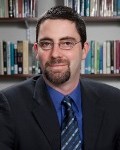 Michael D. Jones, a postdoctoral fellow at Harvard University’s Edmond J. Safra Foundation Center for Ethics, will speak on Wednesday, October 26, from 3-4:30 p.m. in the Campus Center 803 about his research on narratives and public policy. The talk is free and open to the public, and is sponsored by the UMass Public Engagement Project.
Michael D. Jones, a postdoctoral fellow at Harvard University’s Edmond J. Safra Foundation Center for Ethics, will speak on Wednesday, October 26, from 3-4:30 p.m. in the Campus Center 803 about his research on narratives and public policy. The talk is free and open to the public, and is sponsored by the UMass Public Engagement Project.
Jones’ talk, “Studying Stories That Can Change Policy: Narratives in Science Communication, Policy Analysis, and the Policy Process,” will draw on the Narrative Policy Framework (NPF), an approach to studying public policy that Jones helped to develop, elaborate and empirically test.
NPF recognizes political speeches, interest group letters, media reports, policy briefs and other related materials as narratives, or stories, that shape people’s understanding of themselves and their communities. According to Jones, NPF can significantly contribute to explaining policy processes and outcomes.
Jones has applied NPF to understanding public perceptions of solutions to climate change, opinions about gay and lesbian parenting, and mass attitudes toward campaign finance reform.
In his talk, Jones will discuss the role of NPF in synthesizing findings from such disciplines as communication, marketing, neuroscience, and public policy, and also how NPF can improve the communication of scientific information and the practice of policy analysis.
In addition to his work this year at Harvard, Jones is a collaborator with the Cultural Cognition Project at Yale University. He received his Ph.D. in 2010 from the University of Oklahoma.
The UMass Public Engagement Project supports and helps to train faculty members who want their research to make a difference in the world, and is a collaborative project of the Center for Research on Families, the Center for Public Policy and Administration, the Department of Sociology, and the Psychology of Peace and Violence Program.
For additional information about Jones’ visit, please contact M.V. Lee Badgett (lbadgett@pubpol.umass.edu).
 Ramil Maharramov, a 2006 alumnus of the Center for Public Policy and Administration, was featured in a News.Az interview about Azerbaijan and US relations. Maharramov explores the effect of the Armenian diaspora in the US on US foreign policy towards the South Caucasus and Azerbaijan, Azerbaijani attitudes toward the role of the US in the Karabakh problem, and the prospects for progress in the Karabakh settlement, among other things.
Ramil Maharramov, a 2006 alumnus of the Center for Public Policy and Administration, was featured in a News.Az interview about Azerbaijan and US relations. Maharramov explores the effect of the Armenian diaspora in the US on US foreign policy towards the South Caucasus and Azerbaijan, Azerbaijani attitudes toward the role of the US in the Karabakh problem, and the prospects for progress in the Karabakh settlement, among other things.






 Prudence Carter of Stanford University will speak on “The Paradox of Opportunity: Race, Class, Culture, and Boundaries in South African and U.S. Schools” on Tuesday, February 2 at 12:30 p.m. in Thompson 620. The talk is part of the Center for Public Policy and Administration’s Mellon?funded Grants Workshop Speaker Series and is co?sponsored by the Department of Sociology at UMass.
Prudence Carter of Stanford University will speak on “The Paradox of Opportunity: Race, Class, Culture, and Boundaries in South African and U.S. Schools” on Tuesday, February 2 at 12:30 p.m. in Thompson 620. The talk is part of the Center for Public Policy and Administration’s Mellon?funded Grants Workshop Speaker Series and is co?sponsored by the Department of Sociology at UMass.